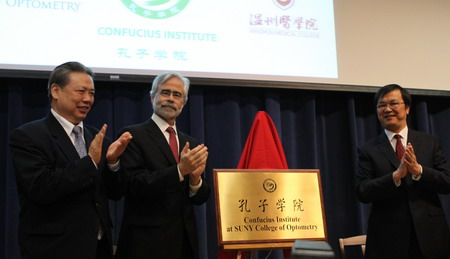China
Confucius Institute forges into healthcare courses
By Zhang Yuwei (China Daily)
Updated: 2010-11-05 11:06
 |
Large Medium Small |
|
 Peng Keyu (left), consul general of the People's Republic of China in New York, President David Heath of SUNY College of Optometry and President Qu Jia (right) of Wenzhou Medical College, at the opening ceremony for the Confucius Institute last week. Provided by Confucius Institute at SUNY College of Optometry |
NEW YORK - The Confucius Institutes, nonprofit public institutions aiming to promote the Chinese language and culture, made significant strides toward bridging the divides of medicine when it opened last week at the State University of New York (SUNY) College of Optometry in Midtown Manhattan.
It is the first Confucius Institute to be located at a university of specialized medicine. Michael Heiberger, director of the institute in Manhattan, said the institute intends to teach the Chinese language, culture as well as Chinese medicine.
"We are different because we will concentrate on Chinese learning and culture, but it will relate to healthcare. We won't be doing the same as other Confucius Institutes in the New York area because we are specialized," Heiberger told China Daily.
In the United States alone, there are now over 70 Confucius Institutes since the first was established in Maryland in 2004. It is headquartered in Beijing under the Office of Chinese Language Council International (known colloquially as Hanban).
Heiberger told China Daily that there has been growing interest in learning Chinese medicine here in the US from both Americans of Chinese descent and American students.
"The learning experience will enable these individuals to have a better understanding of the culture of providers and patients and of existing practices such as traditional Chinese medicine," he said.
Confucius Institutes are now located in over 280 institutions and local communities worldwide. Each funded institution partners with an institution of higher education in China. The SUNY College of Optometry is partnered with the Wenzhou Medical College.
The College of Optometry received its first annual grant of $150,000 from the Chinese government to establish the institute. But Heiberger said that funding after the institute is up and running will mostly depend on collaborating with institutions and course fees.
Classes will be open to the public and will be applicable for anyone in the New York metropolitan area who plans on working or studying in any of the healthcare fields or in biomedical research in China, Heiberger said.
Peng Keyu, consul general of the People's Republic of China in New York, said at the institute's opening ceremony last week that New York has become a city with one of the largest number of Chinese language learners in the US. "In this regard, the Confucius Institute should play an even more crucial role to serve this community," he said.
The institute has a list of about 200 schools and hospitals with which they would like to establish partnerships. Lili Tu, deputy director of the institute, said that institute's pilot programs will be starting in the spring term next year. By then, they hope to offer courses for medical students focusing on healthcare in China as selective courses.
Next to Spanish, Chinese has become an important foreign language in the US. While some have embraced the institutes, others have criticized the institutes as propaganda machines for the Chinese government.
Heiberger disagreed.
"I just don't see anything political at all about the Confucius Institutes. If there is anything, we get too little direction from Hanban that we are almost on our own. I don't see them being very directive or prescriptive at all. Hanban is very open about the idea of specializing, like our institute, as long as you don't stray too far from the basic idea of teaching about Chinese language and culture," he said.
China Daily